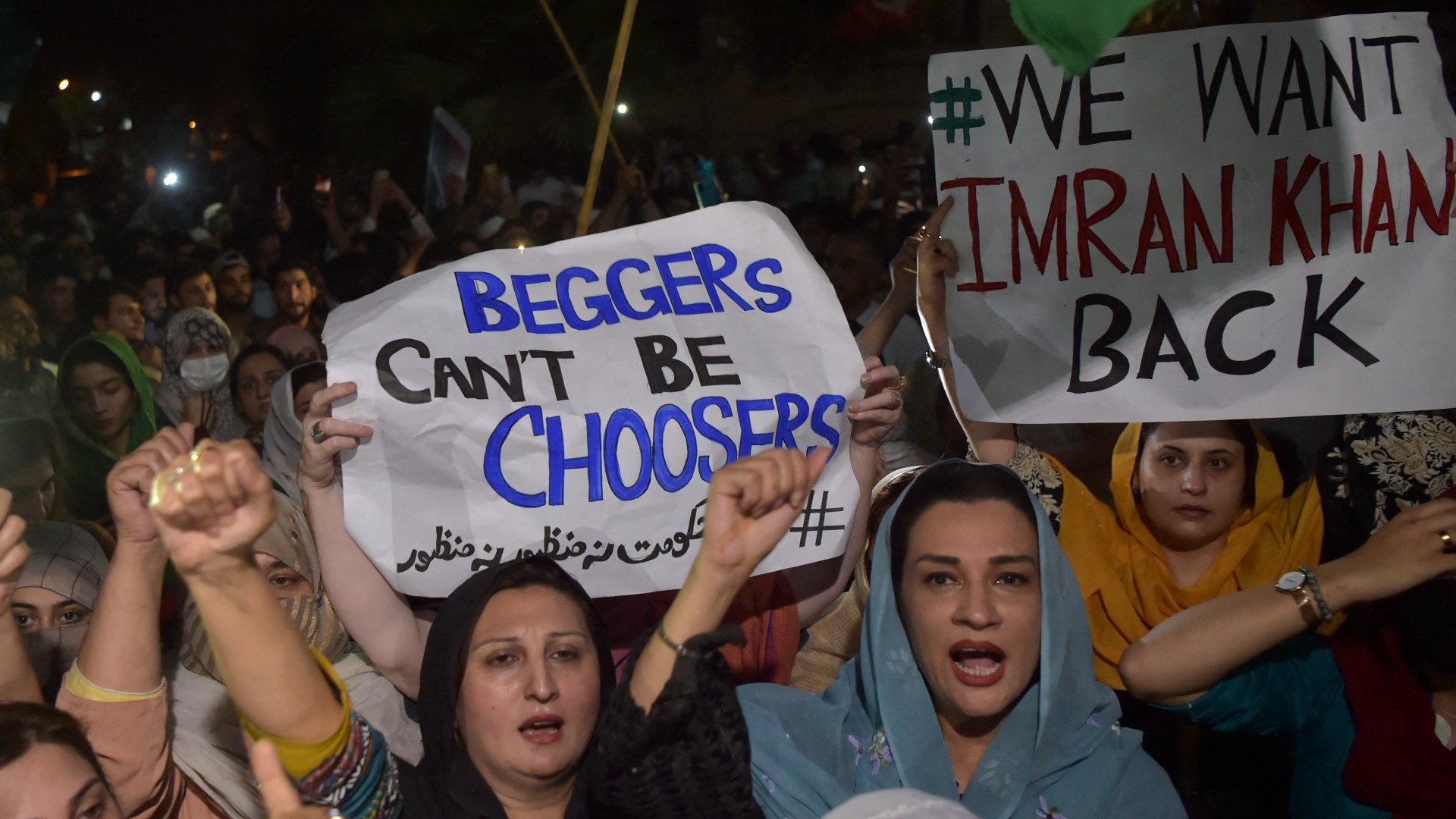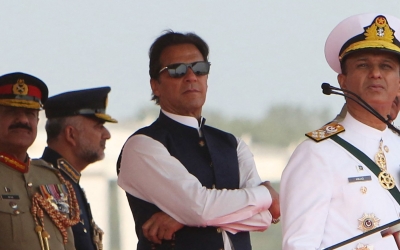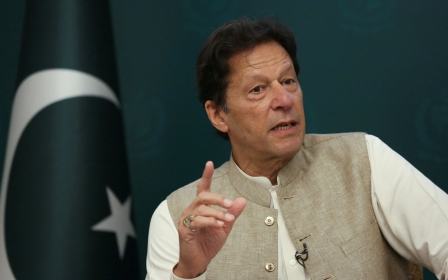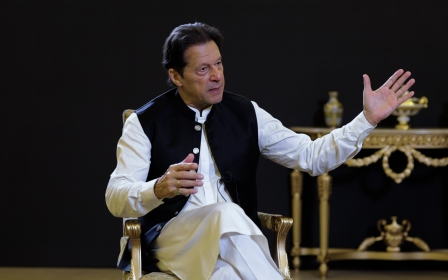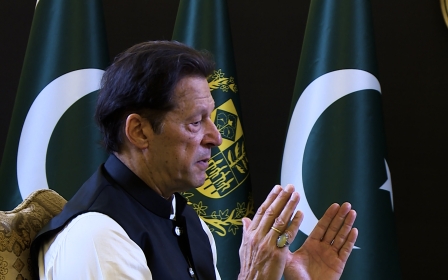Imran Khan: The fall of Pakistan's populist prime minister
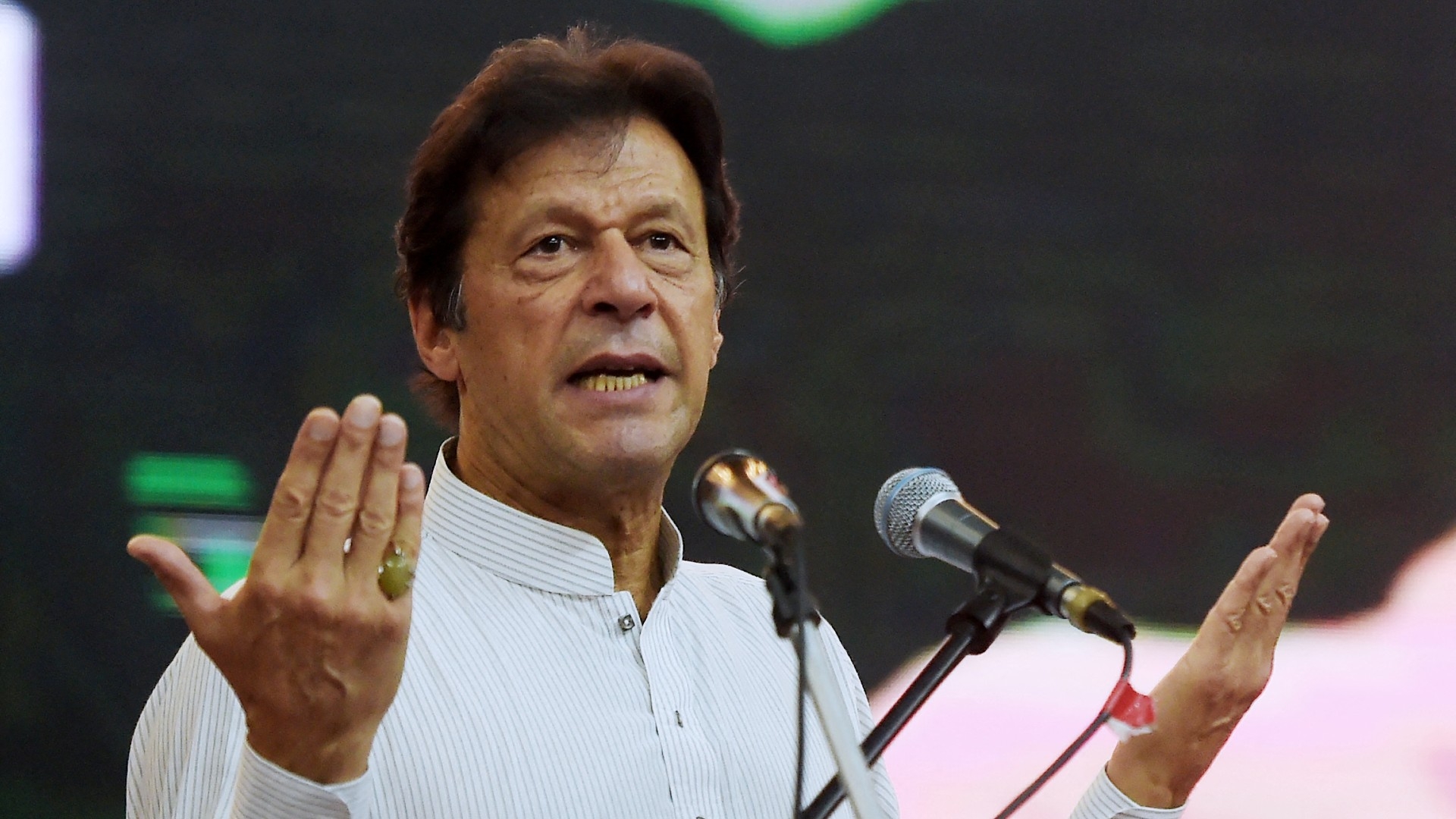
On Saturday, Pakistan Prime Minister Imran Khan was voted out of office after losing a no-vote confidence in his leadership.
Khan's populism requires him to feel self-important; the downfall of a leader of an Islamic country can't happen without a global conspiracy
Pakistan’s constitutional crisis, which emerged after Khan dissolved his own government and the National Assembly, got further complicated after the country’s supreme court restored the assembly and rescheduled a vote of no-trust against Khan.
While all eyes are fixed on what will happen next, Khan’s antagonistic brand of politics needs a review to understand how he reached this point.
From his souring relations with the military to his allegations of a foreign conspiracy against his government, Khan’s populist politics have elevated the country’s real domestic challenges to a global scale. This reflects an inflated sense of self-importance, common in the political post-truth era.
Before entering politics, Khan was perhaps the most endearing personality in Pakistan. His altruistic interests followed his retirement from sports in the early 1990s. His playboy reputation, charisma as a cricket star who captained Pakistan’s World Cup-winning team in 1992, and support from the so-called establishment won him electoral success in 2018.
New MEE newsletter: Jerusalem Dispatch
Sign up to get the latest insights and analysis on Israel-Palestine, alongside Turkey Unpacked and other MEE newsletters
In politics, Khan often stubbornly interpreted the complex realities of Pakistani politics in Manichean terms of good versus evil. A colleague and I interviewed Khan in 1996, the year he launched his Pakistan Tehreek-e-Insaf (PTI) party. Staying at a local guesthouse with his elder sister, he seemed to me like a man with a misplaced sense of entitlement, searching for a post-retirement purpose in life.
My observations were not far removed from reality. Unprepared for the interview, he reacted so bluntly to a few of my questions that his sister had to intervene, correcting his statistics and statements.
Ignoring critics
Even now, many years down the road, when I listen to him at public gatherings and in media appearances, I often find his political logic to be far from reality. He once wanted to rid the country of western financial institutions, and his solution was to increase taxes, ignoring critics who said this would not work without controlling government expenditures.
Instead of listening to his critics, he reportedly said the country lacked people with the leadership skills to implement his vision. Khan has also expressed a desire to rid Pakistan of "evil and corrupt politicians", a populist stance that I recall from my 1996 interview with him, and which he later used to encourage people to stop paying utility bills when the Sharif government was in power.
With a huge civil-military structural imbalance, however, holding politicians solely responsible for the country’s ills would be a half-truth. Before Khan’s rule, Pakistan’s total debt and liabilities were around 30 trillion rupees ($160bn). Now, that figure has risen to around 52 trillion rupees, and inflation is soaring.
Cutting military expenditures is one option, but as the armed forces and their welfare agencies’ influence have entered almost every field of life, no government has been able to fix this problem.
Khan promised voters a "new" Pakistan. In pursuit of this ambition, he has discredited his rivals, put them behind bars, and dragged them into courts. Dissenting journalists have been silenced and media houses throttled. Those who lavished their wealth on Khan and the PTI have been rewarded. As the old Pakistan began to fall apart, the new one was marked by the increasing intervention of intelligence agencies in civilian life.
Days numbered
Rights violations are a case in point. The Pakistani state has long been accused of using the influence of local Taliban groups to control neighbouring Afghanistan. Enforced disappearances are collateral damage from the state’s use of non-state proxies, ie the Taliban - a regional power play in which security interests necessitate violence against not only dissidents, but also average civilians.
The judiciary has criticised Khan for failing to address rights violations. But the final blow to his rule came after the prime minister publicly fell out with the country’s powerful military.
It started five months ago when Khan delayed approval of the army’s recommended candidate to head the Inter-Services Intelligence. Amid significant media coverage, Khan maintained that his government and the military were on the same page, although the dispute was evident for all to see. It was clear then that Khan’s days were numbered.
Losing the trust of the military is not a good omen for any political ruler in Pakistan. During the country’s 75 years of history, civilian leaders have not only been removed from power, but one political leader, Zulfikar Ali Bhutto, was hanged during a military dictatorship.
Instead of pointing to the powerful military, Khan thus found it convenient to blame the US for his fall, for two main reasons. Firstly, Khan’s populism requires him to feel self-important; the downfall of a leader of an Islamic country can’t happen without a global conspiracy. Secondly, he could not accept that his political opponents, who he demeaned for so long, could oust him.
The key takeaway
But by holding that Khan’s antics were unconstitutional, the court threw him back into the political ring to face the vote of no-confidence. Yet, this move also meant that Khan, as the civilian face of Pakistan’s civil-military rule, must pay the price alone for the political anger amassed during his four-year rule.
The irony is that each failed political experience has reinforced the power of the country’s non-democratic forces, especially the military
This runs the risk of further discrediting the country’s political institutions.
No elected prime minister has finished his or her five-year term in office ever since Pakistan came into being in 1947, and so Khan's removal is not a surprise. But the irony is that each failed political experience has reinforced the power of the country’s undemocratic forces, especially the military.
Khan’s replacement also does not provide a solution to the exisiting political crisis so long as Pakistani political parties are unable to put an end to the undemocratic forces' control over national politics through divide and rule, a British legacy in postcolonial Pakistan.
The views expressed in this article belong to the author and do not necessarily reflect the editorial policy of Middle East Eye.
Middle East Eye delivers independent and unrivalled coverage and analysis of the Middle East, North Africa and beyond. To learn more about republishing this content and the associated fees, please fill out this form. More about MEE can be found here.



